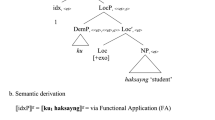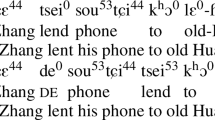Abstract
Contemporary accounts of logic and language cannot give proper treatments of plural constructions of natural languages. They assume that plural constructions are redundant devices used to abbreviate singular constructions. This paper and its sequel, “The logic and meaning of plurals, II”, aim to develop an account of logic and language that acknowledges limitations of singular constructions and recognizes plural constructions as their peers. To do so, the papers present natural accounts of the logic and meaning of plural constructions that result from the view that plural constructions are, by and large, devices for talking about many things (as such). The account of logic presented in the papers surpasses contemporary Fregean accounts in its scope. This extension of the scope of logic results from extending the range of languages that logic can directly relate to. Underlying the view of language that makes room for this is a perspective on reality that locates in the world what plural constructions can relate to. The papers suggest that reflections on plural constructions point to a broader framework for understanding logic, language, and reality that can replace the contemporary Fregean framework as this has replaced its Aristotelian ancestor.
Similar content being viewed by others
References
Almog, J. et al. (eds.) (1989) Themes from Kaplan, Oxford University Press, Oxford.
Bäuerle, R. et al. (eds.) (1983) Meaning, Use, and Interpretation of Language, Walter de Gruyter, Berlin.
Benacerraf, P. and Putnam, H. (eds.) (1983) Philosophy of Mathematics, 2nd edn, Cambridge University Press, Cambridge.
Bocheński, I. M. (1961) A History of Formal Logic, translated and edited by I. Thomas, University of Notre Dame Press, Notre Dame.
Boolos, G. (1975) On second-order logic, Journal of Philosophy 72, 509–537.
Boolos, G. (1984) To be is to be a value of a variable (or to be some values of some variables), Journal of Philosophy 81, 430–448.
Boolos, G. (1985a) Nominalist Platonism, Philosophical Review 94, 327–344.
Boolos, G. (1985b) Reading the Begriffsschrift, Mind 94, 331–344.
Boolos, G. and Jeffrey, R. (1989) Computability and Logic, 3rd edn, Cambridge University Press, Cambridge.
Burge, T. (1977) A theory of aggregates, Noûs 11, 97–117.
Church, A. (1956) Introduction to Mathematical Logic, revised and enlarged edn, Princeton University Press, Princeton.
Davidson, D. (1967) The logical form of action sentences, in Rescher (ed.) (1967), pp. 105–122.
Dummett, M. (1991) Frege: Philosophy of Mathematics, Harvard University Press, Cambridge, MA.
Enderton, H. (1972) A Mathematical Introduction to Logic, Academic Press, New York.
Frege, G. (1884) Die Grundlagen der Arithmetik, Köbner, Breslau; translated by J. L. Austin as The Foundations of Arithmetic, Basil Blackwell, Oxford, 1980, 2nd revised edn.
Frege, G. (1892), Über Begriff und Gegenstand, Vierteljahresschrift für Wissenschaftliche Philosophie 16, 192–205; translated, together with its draft, as “On concept and object” in Frege (1979), pp. 87–117.
Frege, G. (1902) Letter to Russell, 28.7.1902, translation of the German original in Frege (1980).
Frege, G. (1979) Posthumous Writings, ed. by H. Hermes et al., Basil Blackwell, Oxford.
Frege, G. (1980) Philosophical and Mathematical Correspondence, ed. by G. Gabriel et al., Basil Blackwell, Oxford.
Gödel, K. (1947) What is Cantor's continuum problem, The American Mathematical Monthly 54, 515–525; revised and expanded version in Benacerraf and Putnam (eds.), 1983, pp. 470–486.
Grandy, R. E. (1976) Anadic logic and English, Synthese 32, 395–402.
Hazen, A. P. (1993) Against pluralism, Australasian Journal of Philosophy 71, 132–144.
Kamp, H. and Reyle, U. (1993) From Discourse to Logic, Kluwer, Dordrecht.
Kaplan, D. (1989) Demonstratives, in Almog et al. (1989), pp. 481–563.
Kenny, A. (1963) Action, Emotion, and Will, RKP, London.
Kleene, S. C. (1967) Mathematical Logic, Wiley, New York.
Kneale, W. and Kneale, M. (1962) The Development of Logic, Clarendon Press, Oxford.
Leonard, H. S. and Goodman, N. (1940) The calculus of individuals and its uses, Journal of Symbolic Logic 5, 45–55.
Lewis, D. (1991) Parts of Classes, Basil Blackwell, Oxford.
Link, G. (1983) The logical analysis of plurals and mass terms: A lattice-theoretic approach, in Bäuerle et al. (1983), pp. 245–257; reprinted in Link (1998), pp. 11–34.
Link, G. (1991) Plural, in von Stechow and Wunderlich (eds.) (1991), pp. 418–440; reprinted in Link (1998), pp. 35–75.
Link, G. (1995) Algebraic semantics for natural language: Some philosophy, some applications, International Journal of Human–Computer Studies 43, 765–784; reprinted in Link (1998), pp. 189–211.
Link, G. (1998) Algebraic Semantics in Language and Philosophy, CSLI Publications, Stanford.
Lønning, J. T. (1996) Plurals and collectivity, in ter Meulen and van Benthem (eds.) (1996), pp. 1009–1053.
Massey, G. J. (1976) Tom, Dick, and Harry, and all the king's men, American Philosophical Quarterly 13, 89–107.
Mates, B. (1972) Elementary Logic, 2nd edn, Oxford University Press, New York.
Mill, J. S. (1884) A System of Logic, People's ed., Longman, Green, & Co, London.
Morton, A. (1975) Complex individuals and multigrade relations, Noûs 9, 309–318.
Oliver, A. (1994) Frege and Dummett are two, Philosophical Quarterly 44, 74–82.
Peano, G. (1889) Arithmetices principia, nova methodo exposita, Bocca, Turin; translated as “The principles of arithmetic, presented by a new method” by van Heijenoort in van Heijenoort (ed.) (1967), pp. 83–97.
Quine, W. V. (1970) Philosophy of Logic, Prentice-Hall, Englewood Cliffs, NJ.
Quine, W. V. (1972) Methods of Logic, 3rd edn, RKP, London.
Quine, W. V. (1973) The Roots of Reference, Open Court, La Salle, IL.
Quine, W. V. (1991) Immanence and validity, Dialectica 45, 219–230.
Rescher, N. (ed.) (1967) The Logic of Decision and Action, University of Pittsburgh Press, Pittsburgh.
Resnik, M. D. (1988) Second-order logic still wild, Journal of Philosophy 85, 75–87.
Russell, B. (1903) Principles of Mathematics, Cambridge University Press, Cambridge; 2nd edn, George Allen & Unwin, London, 1937.
Russell, B. (1908) Mathematical logic as based on the theory of types, American Journal of Mathematics 30, 222–262; reprinted in van Heijenoort (ed.) (1967), pp. 150–182.
Russell, B. (1919) Introduction to Mathematical Philosophy, George Allen & Unwin, London.
Schein, B. (1993) Plurals and Events, MIT Press, Cambridge, MA.
Simons, P. M. (1982) Numbers and manifolds, in Smith (ed.) (1982), pp. 160–198.
Smith, B. (ed.) (1982) Parts and Moments: Studies in Logic and Formal Ontology, Philosophia Verlag, München.
Tarski, A. (1929) Les fondaments de la géométrie des corps, Księga Pami \c{a} tkowa Pierwszego Polskiego Zjazdu Matematycznego, supplement to Annales de la Société Polonaise de Mathématique 7, 29–33; translated as “Foundations of the geometry of solids” in Tarski (1956), pp. 24–29.
Tarski, A. (1956) Logic, Semantics, Metamathematics, Oxford University Press, Oxford; 2nd edn, Hackett Publishing Company, Indiana, 1983.
Taylor, B. and Hazen, A. P. (1992) Flexibly structured predication, Logique et Analyse 35, 375–393.
ter Meulen, A. and van Benthem, J. (eds.) (1996) Handbook of Logic and Language, Elsevier, New York.
Tomberlin, J. E. (ed.) (1994) Philosophical Perspectives, 8: Logic and Language, Ridgeview, Atascadero, CA.
van Heijenoort, J. (ed.) (1967) From Frege to Gödel: A Source Book in Mathematical Logic, 1879–1931, Harvard University Press, Cambridge.
van Inwagen, P. (1990) Material Beings, Cornell University Press, Ithaca.
van Inwagen, P. (1994) Composition as identity, in Tomberlin (ed.) (1994), pp. 207–220.
von Stechow, A. and Wunderlich, D. (eds.) (1991) Semantik/Semantics: Ein internationales Handbuch der zeitgenössischen Forschung/An International Handbook of Contemporary Research, de Gruyter, Berlin.
Whitehead, A. N. and Russell, B. (1910–3) Principia Mathematica, Vols. I–III, Cambridge University Press, Cambridge; 2nd edn, 1927.
Yi, B.-U. (1995) Understanding the many, Ph.D. Dissertation, UCLA; revised version with a new preface, Routledge, New York & London, 2002.
Yi, B.-U. (1998) Numbers and relations, Erkenntnis 49, 93–113.
Yi, B.-U. (1999a) Is two a property?, Journal of Philosophy 95, 163–190.
Yi, B.-U. (1999b) Is mereology ontologically innocent?, Philosophical Studies 93, 141–160.
Yi, B.-U. (LMP II) The logic and meaning of plurals, II, The Journal of Philosophical Logic, forthcoming.
Yi, B.-U. (preprint) Is there a plural object?, unpublished manuscript.
Author information
Authors and Affiliations
Corresponding author
Rights and permissions
About this article
Cite this article
Yi, BU. The Logic and Meaning of Plurals. Part I. J Philos Logic 34, 459–506 (2005). https://doi.org/10.1007/s10992-005-0560-9
Issue Date:
DOI: https://doi.org/10.1007/s10992-005-0560-9




